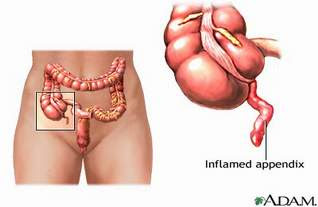- Right lower quadrant pain felt and is usually accompanied by mild fever, nausea, vomiting, and loss of appetite.
- Local tenderness at the point Mc.burney, when done pressure.
- Tenderness may be encountered off.
- The degree of muscle spasm and tenderness if there is constipation or diarrhea are not depending on the severity of the infection and the location of the appendix.
- If the appendix behind the caecum circular, pain and tenderness can feel the lumbar region: when the tip is in the pelvis, these signs can be detected only by examination of the rectal examination.
- Pain on defecation show ends appendix is near the rectum; pain during urination indicates that the tip of the appendix is close to the bladder or ureter.
- There is stiffness in the bottom of the right testis muscles can occur.
- Signs Rovsing can arise with left lower quadrant palpation paradoxical that causes pain felt in the lower right quadrant. If paralytic ileus, and the patient's condition deteriorated.
- In elderly patients, the signs and symptoms of appendicitis can vary greatly. The signs can be very dubious, suggesting destruction of the bowel or other disease processes. Patients may have no symptoms until he suffered a ruptured appendix. The incidence of perforation of the appendix is higher in the elderly, because many of these patients do not seek medical care as soon as patients are younger.
Clinical Manifestations of Appendicitis
Labels
Activity Intolerance
Acute Confusion
Acute Pain
Anxiety
Bowel Incontinence
Chronic Confusion
Chronic Pain
Constipation
Decreased Cardiac Output
Deficient Fluid volume
Deficient Knowledge
Disturbed Body Image
Disturbed Sensory Perception
Disturbed Sleep Pattern
Fluid Volume Deficit
Fluid Volume Excess
Hyperthermia
Imbalanced Nutrition Less Than Body Requirements
Impaired Physical Mobility
Impaired Skin Integrity
Impaired Swallowing
Impaired Tissue Integrity
Ineffective Airway Clearance
Ineffective Breathing Pattern
Knowledge Deficit
Low Self-esteem
Risk for Falls
Risk for Fluid Volume Deficit
Risk for Fluid Volume Excess
Risk for Ineffective Airway Clearance
Risk for Infection
Risk for Injury
Risk for Latex Allergy Response
Risk for Suicide
Self-Care Deficit
Social Isolation
Social Withdrawal
Spiritual Distress
Urinary Retention
Wandering
Labels
Abdominal Typhoid
(2)
Acne
(4)
Acute Otitis Media
(2)
Acute Psychotic
(1)
Anemia
(3)
Anthrax
(1)
Appendicitis
(4)
Ashcraft's Pediatric Surgery
(1)
Asthma
(2)
Benign Prostatic Hyperplasia
(2)
Bronchopneumonia
(2)
CHF
(3)
COPD
(1)
Cerebral Palsy
(2)
Cesarean Section
(2)
Chickenpox
(1)
Colorectal Cancer
(2)
Congenital Dislocation Of The Hip
(1)
Constipation
(3)
Deep Vein Thrombosis
(1)
Delusional Disorders
(2)
Dengue Fever
(3)
Diabetes Mellitus
(1)
Diarrhea
(4)
Dysphagia
(1)
Encephalitis
(1)
Fatigue
(2)
Gastritis
(5)
Goiter
(1)
Hallucinations
(3)
Headache
(1)
Hirschsprung's Disease
(1)
Hyperthyroidism
(1)
Impetigo
(1)
Ischemic Heart Disease
(2)
Liver Abscess
(1)
Low Blood Pressure
(2)
Malaria
(2)
Mastoiditis
(1)
Meningitis
(2)
Morning Sickness
(1)
Nausea
(1)
Osteoarthritis
(1)
Osteomyelitis
(1)
Osteoporosis
(1)
Peritonitis
(1)
Pharyngitis
(2)
Pleural Effusion
(2)
Pneumonia
(2)
Pressure Sores
(1)
Rheumatoid Arthritis
(1)
Scoliosis
(4)
Stroke
(2)
Thyroid Cancer
(2)
Tonsillitis
(2)
Urinary Retention
(2)
Uterine Fibroids
(1)
Vaginal Discharge
(2)
Varicella
(1)
Vertigo
(3)
Vomiting
(2)

